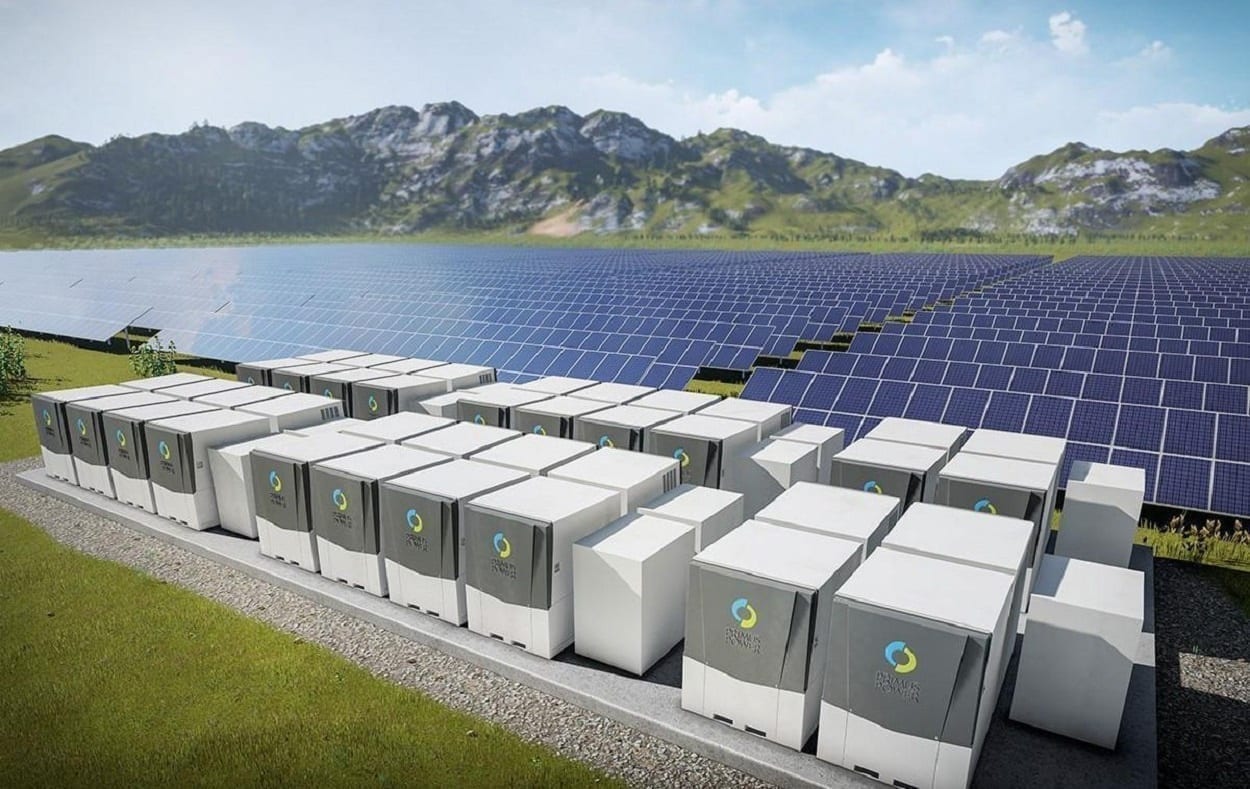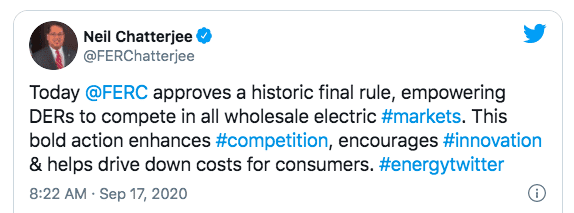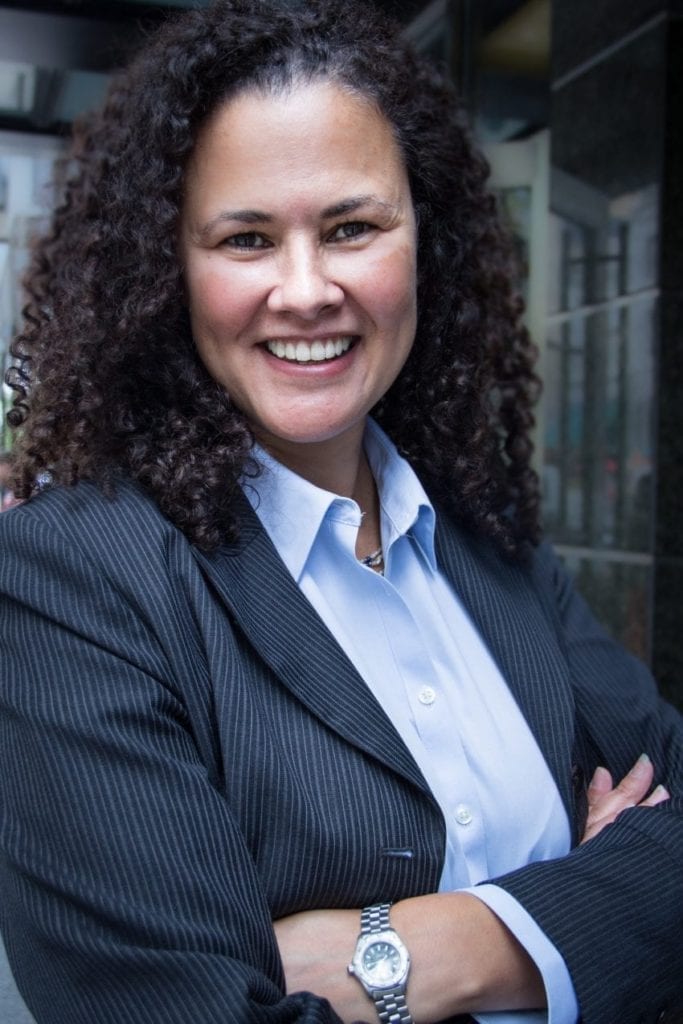FERC Order Backs Grid Market for DERs
The post FERC Order Backs Grid Market for DERs appeared first on POWER Magazine.

The Federal Energy Regulatory Commission (FERC) issued an order that advocates for distributed energy resources (DERs) say will enable DERs, including renewable energy such as solar, wind, and battery storage, to compete on a more-level playing field in the organized capacity, energy, and ancillary services markets run by regional grid operators.
FERC Order No. 2222, adopted Sept. 17 by a 2-1 vote of the commission, directs regional transmission organizations and independent system operators to open their electricity markets to participation by DERs. FERC, in a fact sheet issued after announcing the order, said the new rule enables DERs to participate alongside traditional resources in the regional organized wholesale markets through aggregations, opening U.S. organized wholesale markets to new sources of energy and grid services. It will help provide a variety of benefits including: lower costs for consumers through enhanced competition, more grid flexibility and resilience, and more innovation within the electric power industry."
FERC on Thursday wrote that This rule allows several sources of distributed electricity to aggregate in order to satisfy minimum size and performance requirements that each may not be able to meet individually."
 FERC Chairman Neil Chatterjee called Order No. 2222 historic" in a post on his Twitter feed. Courtesy: Twitter
FERC Chairman Neil Chatterjee called Order No. 2222 historic" in a post on his Twitter feed. Courtesy: Twitter FERC Chairman Neil Chatterjee and commissioner Richard Glick voted in favor of the order, with commissioner James Danly dissenting. The order will take effect 90 days after publication in the Federal Register, and grid operators must make compliance filings to FERC within 270 days of the effective date.
Those compliance filings must propose an implementation plan that FERC said should be appropriately tailored for its region," it also must outline how the final rule will be implemented in a timely manner."
Landmark Day for Competition'Kelly Speakes-Backman, CEO of the Energy Storage Association (ESA) and a keynote speaker at POWER's upcoming Distributed Energy Experience virtual event Oct. 19-22, in a statement shared with POWER said, Today is another landmark day for competition and innovation in the power sector. FERC's Order 2222 removes regulatory barriers to aggregation of distributed resources in wholesale electricity markets, and is the next step forward for energy storage and other distributed energy resources.
Energy storage is increasingly located on local electric grids, in households and businesses, and is often integrated with distributed generation and controllable loads," Speakes-Backman said. Enabling these flexible resources to participate together as virtual power plants' in wholesale markets is a victory for enhancing grid reliability, enabling a more resilient grid, and lowering costs for consumers."
 Kelly Speakes-Backman, CEO of the Energy Storage Association, said FERC's Order No. 2222 is a landmark ... for competition and innovation in the power sector." Speakes-Backman is scheduled to give a keynote address at POWER's Distributed Energy Experience virtual event Oct. 19-22.
Kelly Speakes-Backman, CEO of the Energy Storage Association, said FERC's Order No. 2222 is a landmark ... for competition and innovation in the power sector." Speakes-Backman is scheduled to give a keynote address at POWER's Distributed Energy Experience virtual event Oct. 19-22. FERC on Thursday said the next step in the process is for regional grid operators to revise their tariffs to establish DERs as a category of market participant. These tariffs will allow the aggregators to register their resources under one or more participation models that accommodate(s) the physical and operational characteristics of those resources." FERC said each tariff must set a size requirement for resource aggregations that do not exceed 100 kW."
FERC said the new rule builds off a recent court ruling that affirmed FERC's earlier Order No. 841, establishing the commission's exclusive jurisdiction over the regional wholesale power markets and the criteria for participation in those markets." The commission said the rule does not allow retail regulatory authorities to broadly prohibit DERs from participating in the regional markets. But it does allow retail regulators to continue prohibitions against distributed energy aggregators bidding the demand response of retail customers into the regional markets."
Issues RemainContinuing some of those prohibitions drew a swift rebuke from some renewable energy advocates, even as they applauded the order. Gregory Wetstone, president and CEO of the American Council on Renewable Energy, or ACORE, in a statement shared with POWER said that while Order No. 2222 ... rightfully removes barriers to the participation of aggregated distributed energy resources (DERs) in the nation's wholesale energy markets," which will lower consumer costs, increase electric reliability and unlock the potential for new innovation," there are still some issues with FERC's order.
We're glad today's order appears to recognize the principle that any resource able to provide a defined service should be able to compete in the market, and we look forward to reviewing it in further detail," Wetstone said. Unfortunately, FERC is working against this principle in the nation's capacity markets by continuing to erect barriers to the entry of new technologies in PJM and NYISO through the use of minimum offer price rules. While today's order on distributed energy resources follows in the forward-thinking footsteps of Order No. 841 on energy storage, no market can be free until arbitrary resource-specific price floors are eliminated. We therefore encourage FERC to uphold and extend this same commitment to free and fair market competition by allowing the full participation of new technologies in the nation's energy capacity markets."
The new rule also establishes a small utility opt-in. It specifically prohibits grid operators from accepting bids from the aggregation of customers of small utilities whose electric output was 4 million megawatt-hours or less in the preceding fiscal year, unless the relevant retail regulatory authority for a small utility allows such participation." The rule explains that state and local authorities remain responsible for the interconnection of individual DERs for the purpose of participating in wholesale markets through a DER aggregation."
Much Needed Win for U.S. Consumers'Jeff Dennis, managing director and general counsel for the Advanced Energy Economy business group, in a statement said, We applaud FERC for taking this critical and long-awaited step to open competitive wholesale electricity markets to distributed energy resources. Having worked on this important rulemaking since 2016, we are thrilled that FERC has now taken action to reduce barriers to these technology innovations in wholesale markets.
While we are still reviewing the details of the Commission's decision, it appears that FERC has delivered a welcome and much needed win for U.S. consumers - as Chairman Chatterjee said this morning, When DER aggregations line up and compete with traditional resources to provide all the energy, ancillary services, and capacity that they have to offer - consumers win.' We couldn't agree more," Dennis said.
Katherine Gensler, vice president of regulatory affairs for the Solar Energy Industries Association, in a statement said, We are pleased to see FERC recognize the important role that distributed energy resources and DER aggregators play in reliably delivering clean energy to American homes and businesses. Customers are choosing cost-competitive solar and energy storage from a variety of sources. This rule embraces the trend of increasing use of distributed resources and provides much-needed clarity to grid operators on how to harness the energy and ancillary services they provide."
Gensler continued: Competition in our electricity markets is a critical part of our clean energy transformation. This rule will create jobs, drive local economies, and enable the solar industry to supply 20% of U.S. electricity generation by 2030."
-Darrell Proctor is associate editor for POWER (@DarrellProctor1, @POWERmagazine).
The post FERC Order Backs Grid Market for DERs appeared first on POWER Magazine.